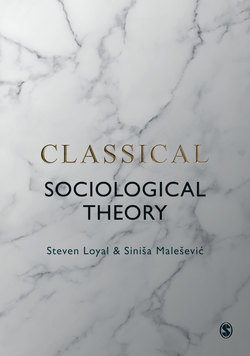Читать книгу Classical Sociological Theory - Sinisa Malesevic - Страница 24
На сайте Литреса книга снята с продажи.
Historical, Social and Political Context
ОглавлениеIn his representation of Plato and Aristotle in the School of Athens, the Italian painter Raphael portrays them as diametric opposites. Plato, an exponent of idealism and rationalism, holds a copy of the Timaeus and points upwards towards the heavens, while Aristotle, a steadfast empiricist and materialist, gestures towards the earth clasping a copy of the Ethics. From a sociology of knowledge perspective, it is clear, however, that both thinkers lived through what can be called the great experiment of direct democracy and were fervently anti-democratic intellectuals. Their politics differ, however, in terms of the emphasis on an anti-democratic position. To an extent this reflected the different historical situation in which Aristotle was working, in some cases writing almost half a century later than Plato. The latter wrote during the end of the Peloponnesian War, blaming democracy for the defeat of Athens and looking to the constitution of Sparta as a solution to class and Athenian international dilemmas. By contrast Aristotle, who had close ties with the Macedonian monarchy, looked to Philip II as a solution to the problems that democracy threw up. The victory of Philip as conqueror and unifier of all Hellas in 338 bce intimated that the city-state composed of morally equal free citizens based on the rule of law and consent was on the wane and monarchical forms of constitution on the rise. As Kelsen notes with reference to the Macedonian monarchy and the Athenian polis:
This monarchy claimed the right to establish itself over democracy, not indeed completely to abolish the latter but to strip it of its most important functions, which it arrogated to itself. Aristotle’s doctrine of the state reflects most clearly this change. Only by keeping this change in view does the political significance of the Aristotelian conception of God and of the moral ideal of a purely contemplative life become comprehensible. Let it be sufficient here to recall that the glorification of the contemplative life, which has renounced all activity and more especially all political activity, has at all times constituted a typical element of the political morality set up by the ideologies of absolute monarchy. For the essential tendency of this form of state consists in excluding the subjects from all share in public affairs. (1937: 15)
[Republished with permission of Chicago University Press from ‘The Philosophy of Aristotle and the Hellenic-Macedonian Policy’, International Journal of Ethics, H. Kelsen, 1937]
In a context where Greek democrats regarded political activity and freedom as connected, Aristotle’s foregrounding of contemplation as the supreme value attempts to challenge this norm.
Nevertheless, they both wrote in a period of acute class conflict. Both theorists then attempt to synthesise different political systems which they confronted. For Plato this is Sparta and Athens; for Aristotle, Athens and Macedonia (Kelsen, 1937).
It has been argued that, like the writings of Socrates and Plato, Aristotle defended and provided an attempt to revitalise and regenerate the social position and values of a declining landed Aristocracy. Wood and Wood (1978) argue that if Plato was the architect of the ‘anti-Polis’, Aristotle was the ‘tactician of conservatism’ whose moderation was an ideological attempt to ensure the survival of aristocratic values. Though less excessive than Plato, he was nevertheless anti-democratic and authoritarian. Aristotle’s conceptualisation of the truly happy and virtuous life is only possible for the well born and wealthy who avoid working for wages or selling goods in the marketplace. Although this again may be too reductive an analysis, it certainly points to some important aspects of Aristotle’s thinking. He presupposed and naturalised slavery and its existence as a given, unable like many thinkers to transcend his social and political horizons. A slave belongs to his master tout court: ‘any human being that by nature belongs to another whenever, in spite of being a man, he is a piece of property i.e. a tool having a separate existence and meant for action’ (Aristotle, 1254a9). In effect, the slave is a mere ‘animate tool’ (empsychon organon) or talking tool (instrumentum vocale).
Challenging the view that slavery is a convention based on force, Aristotle instead saw it as an outgrowth of a natural process. There are always rulers and ruled and this is necessary both in nature and in society. The slave has the function to use his or her body and to be directed by the mind and reason of the master. In an extraordinary rationalisation and justification of slavery as an economic institution, and given his teleological and functional view of the world, slaves he argued are born physically strong, with curved backs to work in fields. This contrasted with their master’s upright stature required for political discussions:
It is then, nature’s purpose to make the bodies of free men to differ from those of slaves, the latter strong enough to be used for necessary tasks, the former erect and useless for that kind of work, but well suited for the life of a citizen of a state, a life which is in turn divided between the requirements of war and peace. (Aristotle, 1998: 1254b16)
